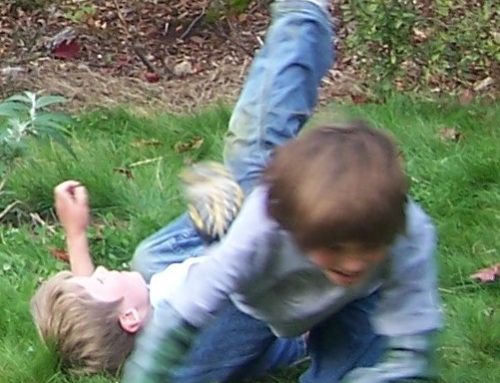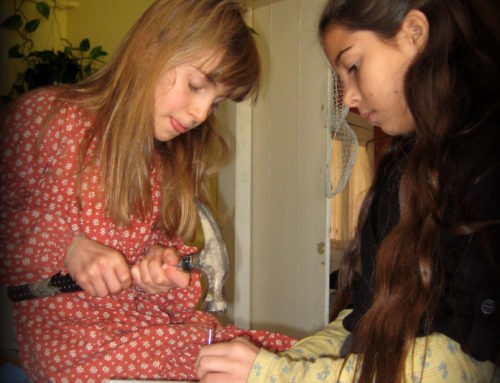Personal and Physical Space
Personal and bodily space are interesting facets of people’s lives, ones that we generally consider the private and sovereign domain of the individual, and that the individual has the right to control and protect. Violations of personal and especially bodily space, particularly by strangers, is taken as quite a serious offense. Control of another person’s body, both in restriction of movement and in control of function, is quite literally imprisonment/slavery. While children are initially dependent on the physical contact and support of others, and thus cannot have the same physical/bodily boundaries as adults, I think it is important that we examine our attitudes toward the physical space of children and where we assume that we, purely by virtue of being an adult, have power over children’s bodies and physical movements, simply because they are children.
I’ve been thinking about adult intrusion of children’s physical space and how really little power kids have in this realm. I’ve noticed a couple of times when Jenny (3) hasn’t seemed into being touched and when her subtle rejection of physical contact is not honored, she sort of turns it into a game to make it acceptable to herself. I’ve been conscious of my presence with her and other kids and how I enter into their physical space.
Invading Kids’ Space
Adults so unthinkingly invade children’s personal and physical space all the time without permission. For example, young children are picked up and coddled by complete strangers (to the child) without regard for how the child might feel. While kids oftentimes have greater physicality in their relationships to each other and even adults, I think it is important for adults to be mindful of how they enter into children’s personal space, how children respond and if there is permission on the part of the child. Permission could look like engagement rather than withdrawal, and a way to gain engagement is through playing and inviting contact rather than just touching. Through invasion of children’s personal space it seems that we teach children that their bodies and their space are not their own and that they are not in control of their experience. Other people have the power and are in control (of you).
I remember being on the playground at an elementary school where I worked and one of the other staff was really getting in this girl’s face. She was maybe six. She totally withdrew and shrunk away but he wouldn’t leave her alone. It made me uncomfortable and I think, if I were her, it would have been quite frightening. Here is this big person with all this authority getting in your space and there isn’t really much you can do about it. At least I think that this is what most kids have learned, and they don’t feel empowered to protect this space in more than a subtle way.
In all of my reading on kids and power-with/freedom, I have come across only brief mention of such invasion and its implications. Children’s physical and personal space is something I would like to observe more, particularly children’s reactions to uninvited adult physical contact or entrance into personal space. I can imagine that there is a feeling of helplessness and vulnerability that children try to navigate. Some children with whom I had rapport, would demand to be put down or protest loudly when I got in their way, picked them up, or entered their physical space uninvited or unwanted. They did not like it at all. Even with this new awareness of respecting children’s personal space, I found myself still in the habit of invasion.
This idea of respecting kids’ physical space is stimulated in part by a story my friend told me about being very young and feeling uncomfortable about the way she was being tickled. She chose to have an inauthentic response in that moment because she didn’t feel empowered to show her true feelings for fear it would hurt the person tickling her. We so unthinkingly enter into children’s space in ways that would be an unthinkable violation of personal boundaries if an adult were the target.
Giving kids’ back the power over their own bodies
If we want to empower children and to truly offer an experience of liberty and freedom, it is very important that we give them power over their own bodies. What more fundamental freedom is there than the freedom of your own physicality? What would a culture be like in which children have power over their own bodies and feel empowered to trust their bodies and their feelings?
Not to assume that we have the right to invade children’s physical and personal space would greatly change the relationships between adults and children, teaching children to trust their own bodies and their own experiences and teaching adults greater respect for children as independent beings. Just the act of communicating through our actions and not just our words, “you have power over your body and I am going to respect that” would change so much about the power dynamics between adults and children and cultivate a whole new way of relating. There may be times when entering into a child’s physical or personal space regardless of permission might be appropriate or necessary but we should not make such interference lightly. With this change in perspective we would not assume it our right as adults to enter into children’s space whenever we want for whatever reason regardless of the child’s needs or wishes.
How can we begin to give this power back to children? First we must question our entitlement to enter into children’s personal and physical space and then we must give greater respect to children managing their own bodies and their own physical experiences. This would include allowing children to eat when they are hungry, sleep when they are tired etc. and to learn to trust the messages their bodies are telling them. Wilhelm Reich, contemporary of Freud, writes a lot about the importance of self-regulation in children, observing that people who have these urges controlled “cannot function or exist without disciplinary guidance” in short, they have lost the ability to trust themselves and become dependent on external authority for direction and guidance. By allowing children to trust their own experience we empower them to trust themselves giving them power to make their own decisions.
Part one in Series, next topic: Children navigating their sexuality… check back in a couple of days for the next post.
I’d love to hear your thoughts, please leave a comment or question below:


Great topic! Looking forward to reading this series.
Best,
Sienna
Hey Elana,
I thank you for your wisdom and thoughtful insights… into respect for children’s bodies and personal space. It is a learning curve to remember that , we, as caregivers to children and their needs is a give and take flow… of inner listening… and trust. It is not always easy to wake up and move with breath and slow down when there are strong feelings going on and a lot of needs to be looked after etc…. But this is a gift on many levels as it offers meeting the need for not only respect but kindness and faith and deep well being.. for all…to nourish themselves. Being able and willing, as an adult or parent to hear, “No, don’t come in now or stop hugging me” etc is a vital listening to respect. It is just as vital to realize the energy one is putting out when anger or upset is happening…. and to imagine how that other person feels by the “biggness” factor of age and authority etc.. that also has great power and influence…on the wellness of the heart space. These awarenesses are crucial in being with small children or big children who are still young…. etc… and need the same honoring.
Touch is important, yet being in touch with the rightness and invitation of offering your hand to help etc…. is building of a stronger relationship and one with love and honor in it as well.
[…] A New Paradigm for Childhood I have come to believe that the current social construction of childhood puts children in a position of subordination to adult authority in ways that are both oppressive and limiting. It teaches fear of and obedience to external authority rather than fostering freedom and promoting the capacity for independent thinking, mutual respect and self-responsibility. Given this, how can we construct childhood in a way that is not controlling or oppressive; that gives children power over their own lives; that builds relationships of mutual respect and cooperation (between younger and older people); and promotes freedom and self-determination for society’s youngest members? Together, let us create a new Paradigm for childhood. ← Respecting Kid’s Personal and Physical Space- part one of series on body space/freedom … […]
I love this! I am very physically affectionate. I knew that I wanted to be more respectful to children in terms of their physical space, so I used to ask, “Can I give you a hug?” Then someone pointed out to me that they are very little and we are very big and perceived as authority figures; they may not feel safe enough to say ‘no’. They taught me a fun technique to use instead. When I feel happy and want to express affection towards a child, I ask “Can I give you a smile, a handshake or a hug?” Sometimes I will get silly and say, “Should I do a dance, give you a fist bump or a hug?” There’s always choices ranging from no contact to full contact and the child is always in control of what level of contact is comfortable for them.